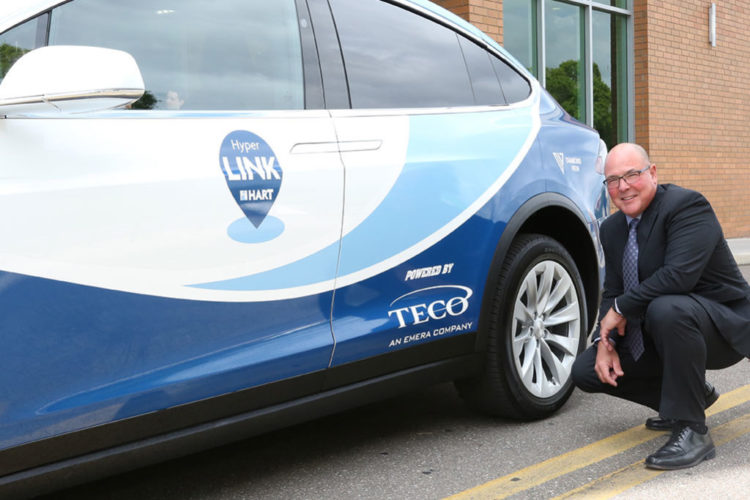Electrification: Powering More
Our companies have a record of making energy cleaner. We know that to achieve a sustainable energy future, we need to think bigger and ensure other kinds of energy use are becoming cleaner too – which is why we are focused on the electrification of vehicles and heating, bringing the benefits of renewable energy to our customers in more ways.
Electric Vehicles
Electric vehicles deliver an emissions-free ride that’s quiet, powerful and requires less maintenance than internal combustion engines. Instead of depending on imported high-carbon fuels, electric vehicles can be powered by locally produced cleaner energy. And as the grid becomes more intelligent, electric vehicles have the potential to act like batteries when they’re not in use, returning surplus electricity to help balance demand on the energy grid.
Emera’s electric companies are all taking steps to promote the benefits of electric vehicles. We are incorporating them into our corporate fleets. We are partnering with government and industry to roll out electric vehicle infrastructure. We are also delivering online resources and real- world events that help our customers learn about the future of clean, electric transportation.
A first for Florida and US
In Florida, our team at Tampa Electric collaborated with industry and municipal partners to deliver a transit solution that’s the first of its kind in the U.S. Tampa Electric provided funding to incorporate four Tesla Model X electric vehicles into the Hillsborough Area Regional Transit Authority's (HART) HyperLINK program, supporting HART's first-mile, last-mile initiative that takes drivers to and from bus stops.
EV excellence in Nova Scotia
It’s no accident that Nova Scotia Power won an Electric Vehicle Excellence Award from Electric Mobility Canada in 2015. Our team in Nova Scotia is sharing the benefits of electric vehicles with customers through initiatives like Ride & Drive, an event that enabled hundreds of community members to see and test- drive electric vehicles, as well as meet with manufacturers and dealers. We are also investing in charging infrastructure in Nova Scotia, partnering to install Atlantic Canada’s first DC Fast Charging Station.
Driving towards a cleaner Barbados
The case for electric vehicles is clear in Barbados, Emera’s showcase for achieving 100 per cent clean energy and electrification by 2045. With more than 200 electric vehicles on the road already, our team at Barbados Light & Power deployed a high-speed charger in late 2016. Work continues on an Electric-Vehicle-to-Grid pilot project, which would take advantage of the ability to draw surplus electricity from electric vehicles when they are not in use.
Heat Pumps
Just as electric vehicles will make transportation cleaner, heat pumps are displacing the carbon-heavy and energy- intensive ways we’ve traditionally cooled and heated our homes and workplaces.
An efficient heat pump can pay for itself through energy savings, and offer as much as an 80 per cent reduction in greenhouse gas emissions relative to heating oil.
Emera’s electric companies in Florida, Nova Scotia and Maine are all working hard to help customers embrace heat pumps, by delivering information about the potential for customer savings and accredited local installers. Nova Scotia Power also offers access to rebates and financing.
Nova Scotia Power’s customers can save up to 50 percent on average on their home heating bills by switching to a heat pump. Their contractor network has installed around 50,000 heat pumps in homes since the program started, which is estimated at close to 85 per cent of the total heat pump market.





